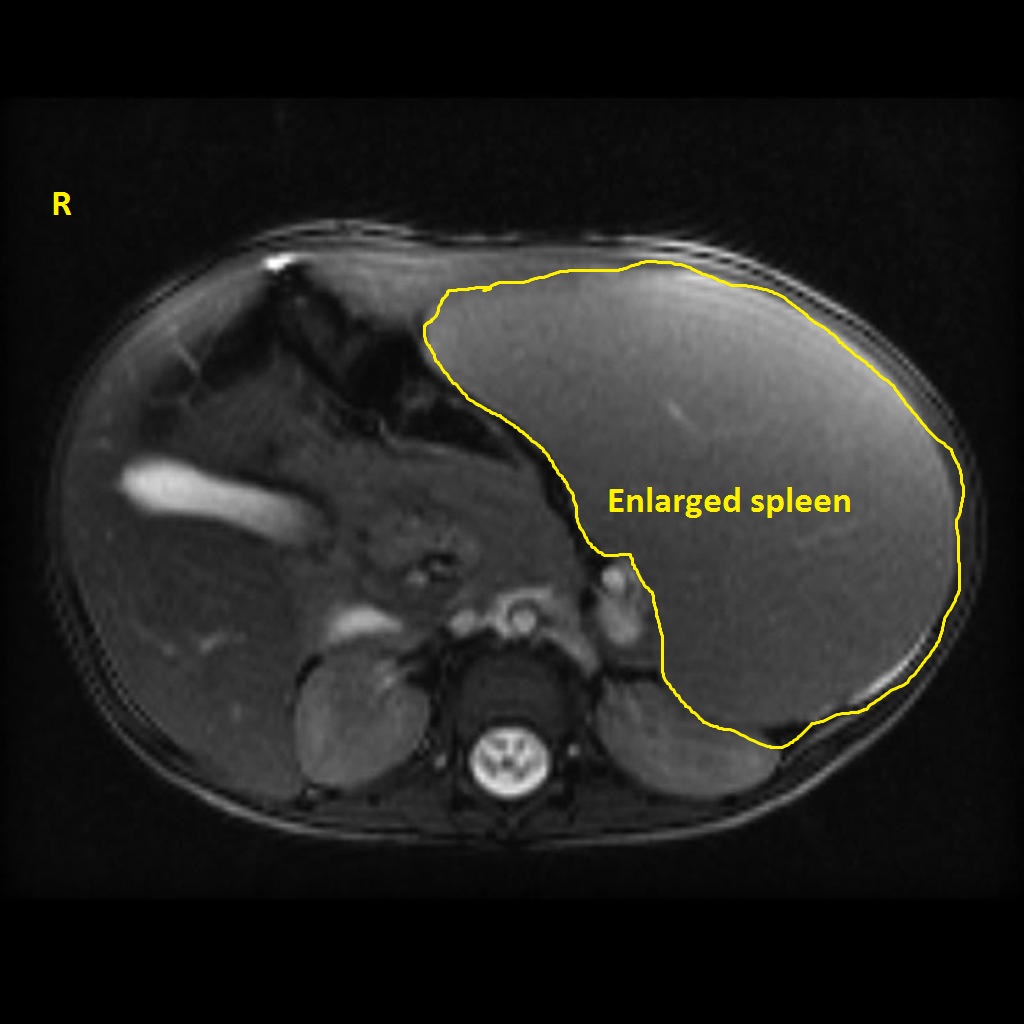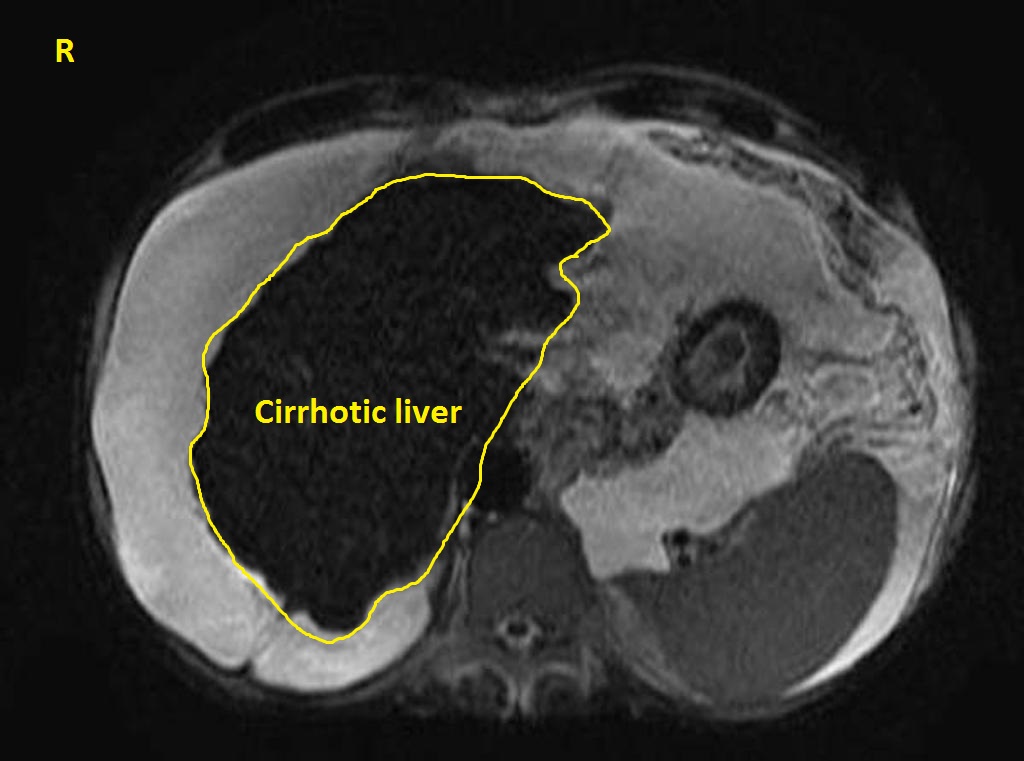Cirrhosis MRI
|
Cirrhosis Microchapters |
|
Diagnosis |
|---|
|
Treatment |
|
Case studies |
|
Cirrhosis MRI On the Web |
|
American Roentgen Ray Society Images of Cirrhosis MRI |
Editor-In-Chief: C. Michael Gibson, M.S., M.D. [1]; Associate Editor(s)-in-Chief: Sudarshana Datta, MD [2]
Overview
The use of magnetic resonance imaging (MRI) as a diagnostic test for cirrhosis is uncertain. MRI differentiates regenerating or dysplastic nodules and hepatocellular carcinoma. MRI is best used as a follow-up study to determine whether lesions have changed in appearance and size. MRI may accurately diagnose cirrhosis and determines disease severity. Decreased signal intensity on MRI may also reveal an iron overload and provides an estimate of the hepatic iron concentration. MR angiography is more sensitive than ultrasonography in diagnosing complications of cirrhosis such as portal vein thrombosis.
MRI
Role of MRI in cirrhosis:[1][2][3][4][5][6][7]
- The role of magnetic resonance imaging (MRI) in the diagnosis of cirrhosis is unclear.
- The use of MRI is limited by expense, patient intolerability, and the ability to obtain information provided by MRI through other means.
- MRI differentiates regenerating or dysplastic nodules from hepatocellular carcinoma by accurately determining the nature of focal lesions.[1][2][8][9]
- MRI is used as a follow-up study to determine whether lesions have changed in appearance and size.
- MRI may accurately diagnose cirrhosis and determines disease severity.[10][11][12]
- Decreased signal intensity on MRI may also reveal an iron overload and provides an estimate of the hepatic iron concentration.
 |
 |
- Abdominal MRI may also be helpful in the diagnosis of portal hypertension. Findings on MRI suggestive of cirrhosis with portal hypertension include:[14][15][16][17]
- Cirrhotic liver, as shrinkage and atrophy in liver
- Re-canalized umbilical vein--pathognomonic
- Dilated portal vein and/or splanchnic veins
- Esophageal varices
- Collaterals in any abdominal organ
- Splenomegaly
- Ascites
MRA
- Magnetic resonance angiography (MRA) may be used to assess portal hypertensive changes including volume and direction of blood flow in the portal vein.
- MR angiography is more sensitive than ultrasonography in diagnosing complications of cirrhosis such as portal vein thrombosis.[18]
- The use of MRA is limited by its expense and the ability of routine ultrasonography with Doppler to obtain adequate information for the diagnosis of cirrhosis and presence of complications.
References
- ↑ Jump up to: 1.0 1.1 Bonkovsky HL, Rubin RB, Cable EE, Davidoff A, Rijcken TH, Stark DD (1999). "Hepatic iron concentration: noninvasive estimation by means of MR imaging techniques". Radiology. 212 (1): 227–34. doi:10.1148/radiology.212.1.r99jl35227. PMID 10405746.
- ↑ Jump up to: 2.0 2.1 Ito K, Mitchell DG, Hann HW, Kim Y, Fujita T, Okazaki H, Honjo K, Matsunaga N (1999). "Viral-induced cirrhosis: grading of severity using MR imaging". AJR Am J Roentgenol. 173 (3): 591–6. doi:10.2214/ajr.173.3.10470885. PMID 10470885.
- ↑ Ernst O, Sergent G, Bonvarlet P, Canva-Delcambre V, Paris JC, L'Herminé C (1997). "Hepatic iron overload: diagnosis and quantification with MR imaging". AJR Am J Roentgenol. 168 (5): 1205–8. doi:10.2214/ajr.168.5.9129412. PMID 9129412.
- ↑ Gandon Y, Guyader D, Heautot JF, Reda MI, Yaouanq J, Buhé T, Brissot P, Carsin M, Deugnier Y (1994). "Hemochromatosis: diagnosis and quantification of liver iron with gradient-echo MR imaging". Radiology. 193 (2): 533–8. doi:10.1148/radiology.193.2.7972774. PMID 7972774.
- ↑ Ito K, Mitchell DG, Gabata T, Hussain SM (1999). "Expanded gallbladder fossa: simple MR imaging sign of cirrhosis". Radiology. 211 (3): 723–6. doi:10.1148/radiology.211.3.r99ma31723. PMID 10352597.
- ↑ Ito K, Mitchell DG, Hann HW, Outwater EK, Kim Y, Fujita T, Okazaki H, Honjo K, Matsunaga N (1998). "Progressive viral-induced cirrhosis: serial MR imaging findings and clinical correlation". Radiology. 207 (3): 729–35. doi:10.1148/radiology.207.3.9609897. PMID 9609897.
- ↑ Finn JP, Kane RA, Edelman RR, Jenkins RL, Lewis WD, Muller M, Longmaid HE (1993). "Imaging of the portal venous system in patients with cirrhosis: MR angiography vs duplex Doppler sonography". AJR Am J Roentgenol. 161 (5): 989–94. doi:10.2214/ajr.161.5.8273643. PMID 8273643.
- ↑ Choi D, Kim SH, Lim JH, Cho JM, Lee WJ, Lee SJ, Lim HK (2001). "Detection of hepatocellular carcinoma: combined T2-weighted and dynamic gadolinium-enhanced MRI versus combined CT during arterial portography and CT hepatic arteriography". J Comput Assist Tomogr. 25 (5): 777–85. PMID 11584240.
- ↑ Qayyum A, Goh JS, Kakar S, Yeh BM, Merriman RB, Coakley FV (2005). "Accuracy of liver fat quantification at MR imaging: comparison of out-of-phase gradient-echo and fat-saturated fast spin-echo techniques--initial experience". Radiology. 237 (2): 507–11. doi:10.1148/radiol.2372040539. PMID 16244259.
- ↑ Ito K, Mitchell DG, Hann HW, Kim Y, Fujita T, Okazaki H, Honjo K, Matsunaga N (1999). "Viral-induced cirrhosis: grading of severity using MR imaging". AJR. American Journal of Roentgenology. 173 (3): 591–6. PMID 10470885. Retrieved 2012-09-06.
- ↑ Ito K, Mitchell DG, Gabata T, Hussain SM (1999). "Expanded gallbladder fossa: simple MR imaging sign of cirrhosis". Radiology. 211 (3): 723–6. PMID 10352597. Retrieved 2012-09-06.
- ↑ Ito K, Mitchell DG, Hann HW, Outwater EK, Kim Y, Fujita T, Okazaki H, Honjo K, Matsunaga N (1998). "Progressive viral-induced cirrhosis: serial MR imaging findings and clinical correlation". Radiology. 207 (3): 729–35. PMID 9609897. Retrieved 2012-09-06.
- ↑ Jump up to: 13.0 13.1 Radiopaedia.org. From the case <"https://radiopaedia.org/cases/6002">rID: 6002
- ↑ Procopet, Bogdan; Berzigotti, Annalisa (2017). "Diagnosis of cirrhosis and portal hypertension: imaging, non-invasive markers of fibrosis and liver biopsy". Gastroenterology Report. 5 (2): 79–89. doi:10.1093/gastro/gox012. ISSN 2052-0034.
- ↑ Aagaard, J; Jensen, LI; Sorensen, TI; Christensen, U; Burcharth, F (1982). "Recanalized umbilical vein in portal hypertension". American Journal of Roentgenology. 139 (6): 1107–1110. doi:10.2214/ajr.139.6.1107. ISSN 0361-803X.
- ↑ Cho, K C; Patel, Y D; Wachsberg, R H; Seeff, J (1995). "Varices in portal hypertension: evaluation with CT". RadioGraphics. 15 (3): 609–622. doi:10.1148/radiographics.15.3.7624566. ISSN 0271-5333.
- ↑ Bandali, Murad Feroz; Mirakhur, Anirudh; Lee, Edward Wolfgang; Ferris, Mollie Clarke; Sadler, David James; Gray, Robin Ritchie; Wong, Jason Kam (2017). "Portal hypertension: Imaging of portosystemic collateral pathways and associated image-guided therapy". World Journal of Gastroenterology. 23 (10): 1735. doi:10.3748/wjg.v23.i10.1735. ISSN 1007-9327.
- ↑ Finn JP, Kane RA, Edelman RR, Jenkins RL, Lewis WD, Muller M, Longmaid HE (1993). "Imaging of the portal venous system in patients with cirrhosis: MR angiography vs duplex Doppler sonography". AJR. American Journal of Roentgenology. 161 (5): 989–94. PMID 8273643. Retrieved 2012-09-06.